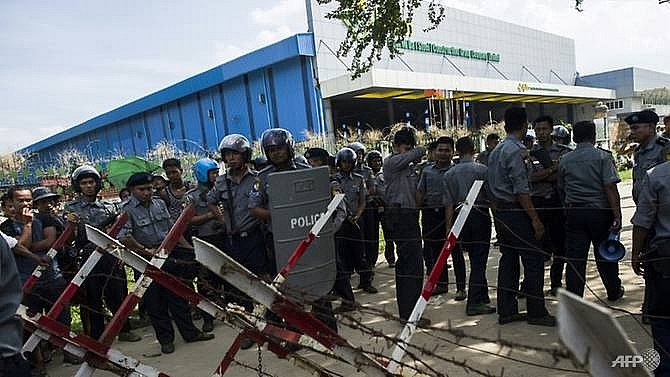Clashes at Myanmar garment factory leave dozens injured
 |
| Riot police were called to violence outside the Chinese-owned Fu Yuen Garment factory after armed thugs beat up some striking workers. (AFP/YE AUNG THU) |
The predominantly female workers started picketing the Chinese-owned Fu Yuen Garment Co Ltd factory in Yangon nearly two months ago over alleged poor conditions and mistreatment, in a country that is becoming Asia's latest hub for low-cost clothing.
While most of the protesters' complaints had been resolved, the factory owners refused to re-hire the 30 workers who initially instigated the strike - prompting more anger from workers who continued to camp outside the factory gates in protest.
But after eight weeks one of the protest leaders, Than Than Soe, told AFP that around "40 thugs" set upon them early on Monday morning.
"The thugs came and started to beat us with wooden sticks and metal bars," she said.
"Twenty-eight people were wounded, six seriously," she said, adding that all but one of the injured were women.
The violence then escalated further as local people hurled rocks and sticks at the factory, smashing several windows.
Some two dozen riot police were deployed to keep back the angry crowd gathering outside the factory gates in Dagon Seikkan township on the outskirts of Yangon.
In a statement released later on Facebook, the police offered a different version of events, accusing the protesters of starting the clashes against non-striking workers.
No arrests have yet been confirmed at the factory which employs some 1,200 women and 100 men, according to the police.
Factory representatives at Fu Yuen could not be reached for comment.
Workers say they set up a union two years ago to fight for their rights after enduring abuse from managers, limited toilet breaks and unbearably hot working conditions.
German supermarket chain Lidl, which sources clothing from Fu Yuen, told AFP it had asked the factory management for a statement, "which will be the basis for an internal assessment and which could lead to measures being taken".
Myanmar's garment industry exports exceeded US$2 billion last year with the European Union as the sector's fastest-growing and largest export market.
Four-fifths of the industry's more than 400,000 workers are women.
But many of those jobs could be threatened if the EU revokes the industry's tariff-free access over the Rohingya crisis that saw the military force more than 720,000 Rohingya Muslims into neighbouring Bangladesh last year.
What the stars mean:
★ Poor ★ ★ Promising ★★★ Good ★★★★ Very good ★★★★★ Exceptional
Related Contents
Latest News
More News
- France supports Vietnam’s growing role in international arena: French Ambassador (January 25, 2026 | 10:11)
- Foreign leaders extend congratulations to Party General Secretary To Lam (January 25, 2026 | 10:01)
- Russian President congratulates Vietnamese Party leader during phone talks (January 25, 2026 | 09:58)
- Worldwide congratulations underscore confidence in Vietnam’s 14th Party Congress (January 23, 2026 | 09:02)
- Political parties, organisations, int’l friends send congratulations to 14th National Party Congress (January 22, 2026 | 09:33)
- 14th National Party Congress: Japanese media highlight Vietnam’s growth targets (January 21, 2026 | 09:46)
- 14th National Party Congress: Driving force for Vietnam to continue renewal, innovation, breakthroughs (January 21, 2026 | 09:42)
- Vietnam remains spiritual support for progressive forces: Colombian party leader (January 21, 2026 | 08:00)
- Int'l media provides large coverage of 14th National Party Congress's first working day (January 20, 2026 | 09:09)
- Vietnamese firms win top honours at ASEAN Digital Awards (January 16, 2026 | 16:45)

 Tag:
Tag:




















 Mobile Version
Mobile Version